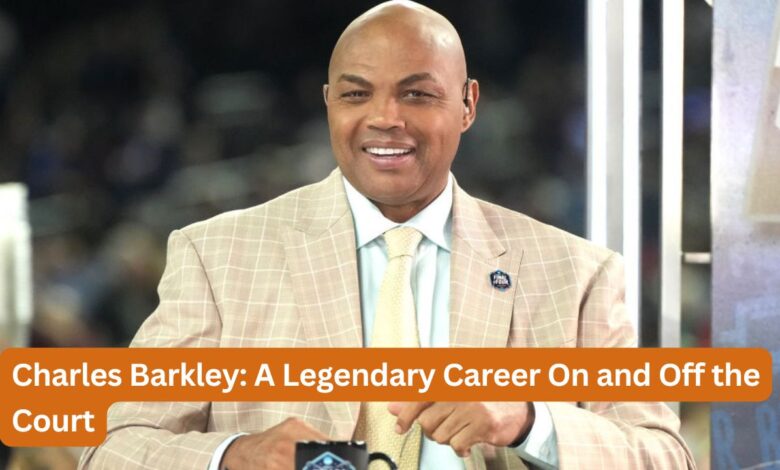Charles Barkley: A Legendary Career On and Off the Court

Introduction
Charles Barkley is a name synonymous with excellence in basketball. Known for his dominant presence on the court and his charismatic personality off it, Barkley has carved out a legacy that transcends the sport. This article delves into the life and career of Charles Barkley, exploring his journey from a standout college player to an NBA legend and a beloved television personality.
Early Life and College Career
Charles Wade Barkley was born on February 20, 1963, in Leeds, Alabama. Growing up in a small town, Barkley faced numerous challenges, including economic hardships and the pressure of standing out in a competitive environment. Despite these obstacles, his natural athletic abilities shone through early on, particularly in basketball.
Barkley attended Auburn University, where he quickly made a name for himself as one of the most formidable players in college basketball. Standing at 6 feet 6 inches and weighing 250 pounds, his unique combination of size, speed, and agility earned him the nickname “The Round Mound of Rebound.” During his three years at Auburn, Barkley averaged 14.1 points and 9.6 rebounds per game, leading the Tigers to their first NCAA Tournament appearance in 1984. His stellar performance in college set the stage for an illustrious professional career.
NBA Career: Dominance and Controversy
In the 1984 NBA Draft, Charles Barkley was selected as the fifth overall pick by the Philadelphia 76ers. Joining a team that featured stars like Julius Erving and Moses Malone, Barkley quickly established himself as a force to be reckoned with. His rookie season saw him average 14 points and 8.6 rebounds per game, earning him a spot on the NBA All-Rookie First Team.
Barkley’s time with the 76ers was marked by both individual brilliance and team struggles. Despite his impressive stats, including leading the league in rebounding multiple times, the 76ers often fell short in the playoffs. Barkley’s outspoken nature and frequent clashes with coaches and officials also garnered media attention, adding to his controversial reputation.
In 1992, Barkley was traded to the Phoenix Suns, where he experienced a career resurgence. His first season with the Suns was arguably his best, as he averaged 25.6 points, 12.2 rebounds, and 5.1 assists per game, leading the team to the NBA Finals. Although the Suns ultimately lost to Michael Jordan’s Chicago Bulls, Barkley’s performance earned him the NBA Most Valuable Player (MVP) award.
After four seasons with the Suns, Barkley was traded to the Houston Rockets in 1996, where he teamed up with Hakeem Olajuwon and Clyde Drexler. Despite high expectations, the Rockets were unable to secure another championship, and Barkley retired in 2000 after 16 seasons in the NBA. Throughout his career, he accumulated 11 All-Star selections, 11 All-NBA Team honors, and was inducted into the Naismith Memorial Basketball Hall of Fame in 2006.
International Success: The Dream Team
In addition to his NBA success, Charles Barkley was a key member of the United States “Dream Team” that competed in the 1992 Barcelona Olympics. Widely regarded as the greatest basketball team ever assembled, the Dream Team dominated the competition, winning the gold medal with ease. Barkley was the team’s leading scorer, averaging 18 points per game and showcasing his ability to excel on the international stage.
Barkley’s contributions to the Dream Team cemented his status as one of the top players in the world and played a significant role in popularizing basketball globally. His charisma and larger-than-life personality made him a fan favorite, both in the United States and abroad.
Post-Retirement: Broadcasting and Philanthropy
Following his retirement from professional basketball, Charles Barkley transitioned seamlessly into a career in broadcasting. He joined the TNT network as an analyst for the popular show “Inside the NBA,” where his candid and often humorous commentary quickly made him a beloved figure in sports media. Barkley’s insights, combined with his willingness to speak his mind, have made him one of the most influential and entertaining personalities in sports broadcasting.
In addition to his work on television, Barkley has been actively involved in philanthropy. He has donated millions of dollars to various causes, including education and disaster relief efforts. Barkley’s generosity extends to his alma mater, Auburn University, where he has funded scholarships and other initiatives to support students.
Barkley’s commitment to giving back to his community and helping those in need reflects the same determination and passion he displayed on the basketball court. His philanthropic efforts have earned him widespread respect and admiration, further solidifying his legacy as not just a basketball legend, but a humanitarian as well.
Legacy and Impact on the Game
Charles Barkley’s impact on the game of basketball is undeniable. His unique style of play, combining power and finesse, revolutionized the role of the power forward. Barkley’s ability to dominate in the paint, despite being shorter than many of his opponents, showcased the importance of skill, determination, and versatility.
Barkley’s influence extends beyond his on-court achievements. His outspoken nature and willingness to address social and political issues have made him a prominent voice in the sports community. Barkley has never shied away from controversy, using his platform to advocate for change and challenge the status quo.
His contributions to basketball have inspired countless players, and his legacy is evident in the way the game is played today. Modern players like LeBron James and Draymond Green have cited Barkley as an influence, particularly in how they approach the power forward position and their roles as vocal leaders.
Personal Life and Challenges
Despite his success, Charles Barkley has faced numerous challenges in his personal life. His battles with weight and health issues have been well-documented, as have his struggles with gambling. Barkley has been open about his experiences, using them as opportunities to educate others and advocate for responsible behavior.
Barkley’s candidness about his struggles has endeared him to fans, who appreciate his honesty and authenticity. His ability to confront and overcome personal challenges serves as an inspiration to many, demonstrating that even the most successful individuals face adversity.
Conclusion
Charles Barkley’s journey from a small-town kid in Alabama to an NBA legend and influential media personality is a story of talent, perseverance, and authenticity. His contributions to basketball, both on and off the court, have left an indelible mark on the sport and its culture.
As a player, Barkley’s unique combination of power and agility redefined the power forward position, and his dominance on the court earned him numerous accolades and a place in the Hall of Fame. As a broadcaster and philanthropist, Barkley’s candidness and generosity have made him a beloved figure beyond the world of sports.
Charles Barkley is more than just a basketball icon; he is a cultural figure whose impact will be felt for generations to come. His legacy is one of excellence, resilience, and an unwavering commitment to being true to oneself. Whether on the court, in the studio, or through his philanthropic efforts, Barkley continues to inspire and influence, cementing his place as one of the most significant figures in basketball history.




